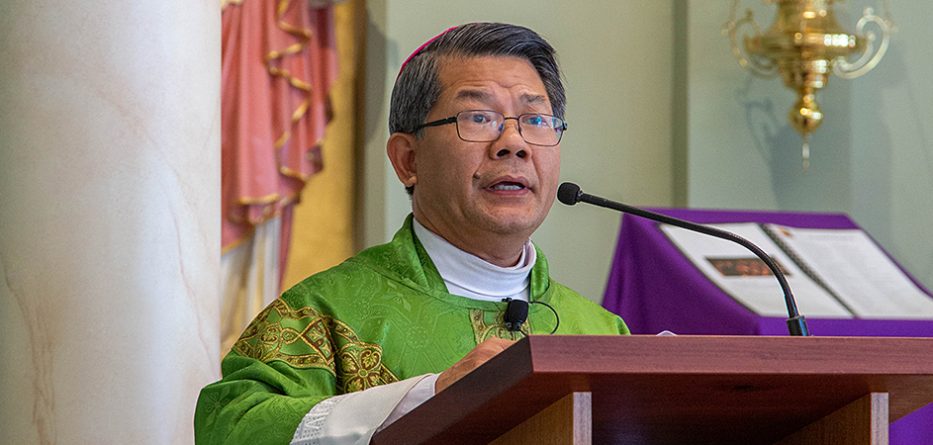Most Reverend Vincent Long Van Nguyen OFM Conv DD STL, Bishop of Parramatta
Homily for the Fifth Sunday in Ordinary Time in Year B 2021 at St Patrick’s Cathedral, Parramatta
Readings: Job 7:1-7; 1Cor 9:16-23; Mark 1:29-39
7 February 2021
When old answers fail new questions
Dear friends,
They say a crisis can break or make a person. This was true of Steve Jobs when he was forced out of the Apple company he had co-founded. But this lowest ebb of his life proved to be the turning point. He attested as follows in his autobiography: “The heaviness of being successful was replaced by the lightness of being a beginner again, less sure about everything. It freed me to enter one of the most creative periods of my life.”
We believers can all learn to embrace “the lightness of being a beginner again” from time to time, not so much to become great entrepreneurs as to grow more deeply in our faith. For if there is anything certain in our faith journey, it is the pattern of growth through suffering: God’s ways invariably involve the pain of letting go, of beginning again, of going forward with fresh vision and renewed courage and trust.
This was the pattern that Job the biblical hero was subjected to. In the first reading, we hear part of an account of his struggle with suffering and the limits of traditional theology that was supposed to help him cope with such suffering. Job is at the lowest ebb of his life. Everything that he owned has been abruptly taken away: his possessions, his children, his status and his good name. As he sits on a dung heap, his wife and his best friends join the chorus of judging him through the lens of the old reward and punishment binary. With pious platitudes and shallow explanations, they maintain that God would only punish the guilty and thus Job is on the receiving end of a victim blaming talk.
Job, however, rejects the idea that success is the ultimate measure of one’s faith and that one’s integrity is questioned by his misfortune. He moves from lament over the fickleness of life, to protest against the simplistic reward and punishment binary and finally to accept that everything was owed to the Creator. “Remember that my life is but a breath” he cries at the end. This is his realisation that we can claim nothing to ourselves, even the right to exist. So, rather than feeling that we are entitled to something, Job teaches us that we should reset our lives with the attitude that we owe everything to God. No wonder the book of Job contains some of the most refined and distilled wisdom teachings in the Old Testament. Perhaps, it deserves to be read more often than the lectionary allows us.
Job learned to move to a deeper and more mature faith through suffering. This is also the pattern that Paul went through. He knew personally what it meant for him to die to his previously held certitudes, privileges and entitlements in order to live with the uncertainty and vulnerability of the Christian faith. In fact, “living with the lightness of being a beginner again” is Paul’s constant theme as he reordered his life according to the Gospel of unmerited grace. It was this grounding in the way of Jesus that prompted him “to offer the Good News free” rather than to use the human calculus of who is worthy and who is not.
The Gospel tells us how Jesus goes about announcing the coming of the Kingdom and embodying the reality of that Kingdom in his public ministry. In him, we meet a God who heals the sick, casts out evil spirits and makes people whole again. In him, we see God’s definitive response to the perennial questions that Job raises on behalf of humanity. Jesus conquered the forces of evil, not only by his miraculous powers but also by his commitment to the reign of God’s mercy, justice and love. He has shown us the way to defeat the footprint of darkness by his own suffering, death and resurrection. In him, we can draw the same power with which to conquer the evil forces today.
Dear friends,
The Word of God teaches us that crisis can be the catalyst for growth and it is a critical and more engaged faith that is the object of the Christian life. Job and Paul underwent profound crises that shook the foundations of their religious, social and personal worlds. They moved beyond doubt, despair and even critique of their traditional belief system to a deeper faith. Meanwhile, Peter’s mother-in-law also became a model disciple. She got up and served others after being cured of her illness. Healthy discipleship always grows. It does not stay the same.
We live in constant change and at times like Job and Paul we find no adequate answers to our predicaments. As parents, too, we watch helplessly as our children drift away from the spiritual heritage we endeavour to pass on to them. God’s Word today inspires us to move from doubt and despair to vulnerable trust. As our faith is tried, we learn to reset our lives with the utter gratuity of God’s love. It is what the first Beatitude is all about. Then we can live “the lightness of being the beginner again” with less self-importance, less centered on our own security and more focused and engaged with God’s concern for the world.








